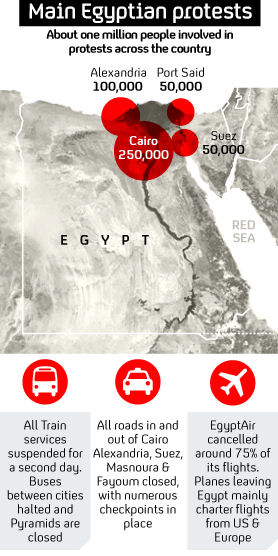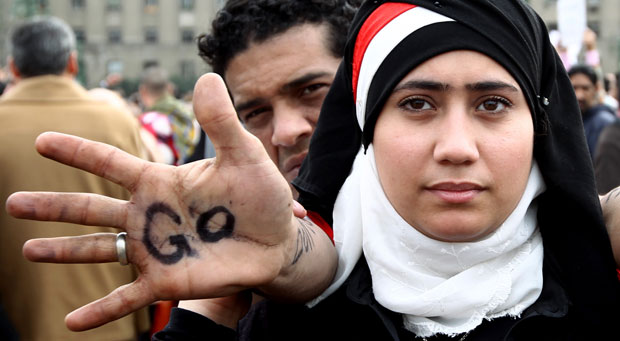Protesters mass across Egypt to call for an end to Mubarak
Channel 4 News correspondents report on a historic day across Egypt as around a million people fill the streets, urging President Mubarak to stand down. He reportedly prepares to address his country.
An estimated two million people poured in to Cairo on Tuesday in the biggest demonstration seen so far in an unprecedented people’s uprising against President Hosni Mubarak.
Hafez El Marazy – a political analyst with the Al Arabiya TV channel – told Channel 4 News that the President was preparing to go on to state television and tell his people he would not be seeking election for another term of office.
“The problem is that it always comes too late, too little,” he added. Mubarak would be forced to stand down and make way for a government of national unity, which would prepare for elections in six or seven months’ time, he predicted.

Peaceful protests
Across Egypt demonstrators gathered for peaceful protests in the Arab world’s most populous nation, while soldiers, whose tanks have lined the streets since Friday, said they would not stop the unrest.
Huge protests took place in other major Egyptian cities including Alexandria and Suez, which last week saw violent riots between demonstrators and police.
In the capital Cairo 250,000 rallied in Tahrir Square which has become a focal point of the demonstrations.
Channel 4 News Presenter Jon Snow, who is in Cairo, said a peaceful and euphoric crowd had gathered in enormous numbers, while the army were complicit and cooperative with demonstrators. Tanks daubed with anti-Mubarak graffiti stood by.
“Every bridge across the Nile has people streaming across,” he said.
“There is a complete cross section of people including lawyers, professionals, workers and students. It feels primarily like a middle class movement with a strong belief that Mubarak may fall.”
“There can be dialogue but it has to come after the demands of the people are met and the first of those is that President Mubarak leave.” Mohamed ElBaradei
Meanwhile on Egyptian state television, footage appeared to avoid the crowds of gathered people and showed calm scenes of Cairo and The Nile.
People’s revolution
Demonstrations erupted in Egypt last week and have been largely inspired by a movement in Tunisia which toppled President Zine-al Abidine Ben Ali in a matter of weeks.
As the apparent “domino effect” appears to spread to other Arab states, on Tuesday the King of Jordan sacked his government and appointed a new Prime Minister in a bid to head off growing unrest.
Protests in Yemen, Algeria and Lebanon has also been reported.
Read more from Channel 4 News: will the domino effect topple other Arab world leaders?
Egyptian protesters speaking in Cairo said the time had come for President Mubarak to move aside to let a transitional government take control before free and fair elections can be held.
Foreign Affairs Correspondent Jonathan Rugman said people in central Cairo waved flags and banners saying “the people have sacked the President”, “today is the last day”, “Mubarak go to Ben Ali in Saudi” and “Israel, if you like Mubarak so much, why don’t you take him?”
“This no longer feels like an uprising,” Jonathan Rugman said. “It feels like a people’s revolution.”
Opposition figurehead Mohamed ElBaradei said Mubarak, 82, must leave the country before the reformist opposition would start talks with the Government on the future of the Arab world’s most populous nation.
“There can be dialogue but it has to come after the demands of the people are met and the first of those is that President Mubarak leaves,” he told Al Arabiya television.
US Ambassador to Egypt Margaret Scobey spoke to ElBaradei on Tuesday, the State Department said in its first acknowledgment of any recent direct contact with the opposition figure.
“As part of our public outreach to convey support for an orderly transition in Egypt, Ambassador Scobey spoke today with Mohammed ElBaradei,” State Department spokesman P.J. Crowley said in a message on Twitter.
Mubarak’s grip looked increasingly tenuous after the army pledged on Monday night not to confront protesters, effectively handing over the streets to them after they pledged to bring out one million people nationwide.
Kissinger on Egypt: Revolution and the change of American influence
Dr Henry Kissinger, who famously brokered the end of the 1973 Yom Kippur war which begun when Egypt and Syria attacked Israel, speak to Channel 4 News about the ongoing unrest in Egypt.
"This is a period of enormous uncertainly because the crowds that are now producing this upheaval and this revolution are united to get rid of Mubarak," Dr Kissinger told Channel 4 News.
"But they clearly have not developed an idea of what direction Egypt should go. The struggle as to that direction will begin with departure of Mubarak.
"What [protesters] are calling democracy is a change of regime, possible a change of leader, possible change of system. That does not necessarily make that want they want is a democratic answer. That is gong to be the decisive issues and it's an issue the Egyptian people will have to decide."
Read more from Kissinger on what could happen next in Egypt
International reaction
Governments, airlines and tour operators have been evacuating their nationals out of Egypt. Britain will send a charter aircraft to Egypt on Wednesday to bring back Britons who wish to leave, Foreign Secretary William Hague said on Tuesday.
Interviewed on Channel 4 News Mr Hague said the Prime Minister had told his Egyptian opposite number, Ahmed Shafiq, that his government had to “respond to this immense demand for change” and agree to move towards free and fair elections “with some urgency”.
He added: “There is a danger otherwise of more disorder, of economic difficulties getting much greater, of extemists gaining hold. So we do call on President Mubarak and the Egyptian government to deal urgently with this.”
In the US, John Kerry became the first prominent American politician to call on Mubarak to step down.
In an article for the New York Times, Senator Kerry – chair of the Senate Foreign Relations Committee and a former Democratic presidential candidate – said it was time for America to look beyond the Mubarak era and develop a new Egyptian policy.
“The best way to avoid unrest turning into upheaval is for President Mubarak to take himself and his family out of the equation,” Senator Kerry wrote.
Alexandria
Channel 4 News International Editor Lindsey Hilsum reported that thousands had gathered for peaceful protests in Egypt’s biggest port and “intellectual capital” of Alexandria.
Soldiers had been ordered to stand down and to leave weapons inside tanks so the people could see they have been ordered not to be aggressive.

Despite soldiers erecting yellow and blue flags to show a state of emergency – the army seemed to be acting as if they are with the people, Lindsey Hilsum said.
“At the central mosque in Alexandria thousands had gathered as they had every day since the movement began,” she said.
Two small children held banners reading “If you let go, we’ll let go” and “the liar says the demonstrations are small” in response to how the state has tried to mange the crisis.
Others read: “Mr Obama don’t bet on a loser”, “Egypt is tired, just leave” and “Leave Mubarak – Tel Aviv is your home”.
-
Latest news
-
As India goes to the polls in the world’s largest election – what do British-Indians think?6m

-
Tees Valley: Meet the candidates in one of the biggest contests coming up in May’s local elections4m

-
Keir Starmer says public sector reform will be a struggle7m

-
Nicola Sturgeon’s husband Peter Murrell charged with embezzlement of funds from SNP1m

-
Ukraine might finally get $60billion in American weapons and assistance to defend against Russia3m

-




